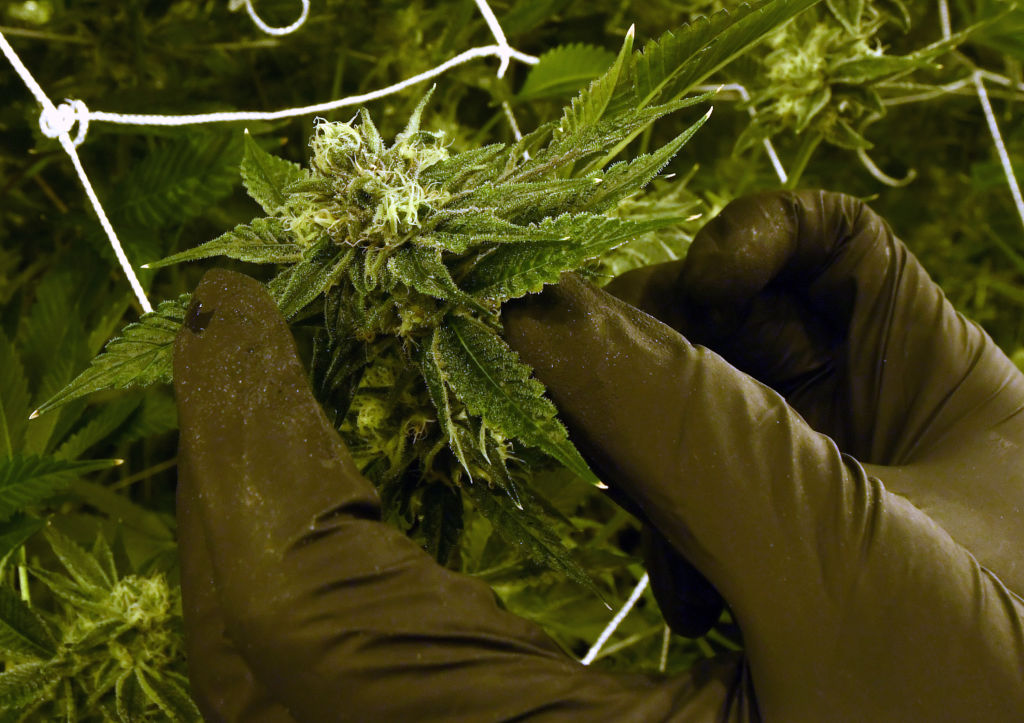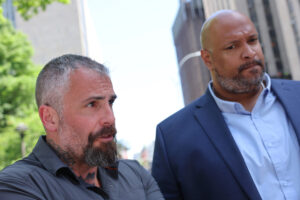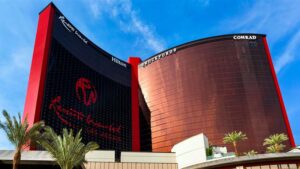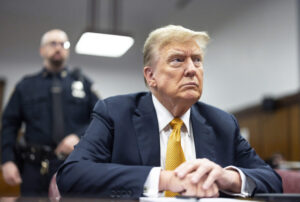6:17
News Story
The Nevada Supreme Court heard arguments Tuesday on whether a referendum on public funding for the proposed A’s stadium in Las Vegas should be allowed on the November ballot, and whether the Board of Pharmacy’s listing of cannabis as a Schedule 1 substance is at odds with the Nevada Constitution.
Attorney Bradley Schrager, representing former union officials Danny Thompson and Thomas Morley and other backers of the baseball stadium, argued a ballot initiative from Schools Over Stadiums (SOS), a political action committee tied to the Nevada State Education Association, inadequately describes what it intends to achieve. The initiative asks voters to disapprove up to $380 million in publicly financed bonds and tax credits pledged by lawmakers to build the stadium.
Judge James T. Russell of Carson City ruled in November the petition’s explanation must include the entire text of Senate Bill 1, which state legislators passed last year in a special session. The measure facilitates the relocation of the Oakland A’s baseball team to a new stadium, built in part with public funds. Russel enjoined the SOS PAC from circulating the petition, which requires 102,000 signatures by June 26 to be eligible for the November ballot.
The Supreme Court must decide whether the petition’s explanation, which cites only sections of the law to be eliminated, is sufficient or must include the entire statute it seeks to change.
Justice Lidia Stiglich likened SB 1 to a car. “Don’t the voters need to know the whole car to know how many wheels you’re taking off?”
“People need to be informed of what this excision would do,” said Bradley Schrager, the attorney arguing on behalf of the stadium supporters.
Nevada law limits the explanation on an initiative petition to no more than 200 words. How much time is a registered voter standing in a grocery store parking lot likely to spend reading an initiative petition explanation?
“I personally have gathered thousands of petition signatures over the years,” Chris Daly of NSEA said after the hearing. “Maybe one out of 100 folks that come along would read a 200 word paragraph. I have never had a person read the entire petition.”
Daly says the lawsuit’s backers are doing whatever they can to derail the petition.
Oakland A’s owner “John Fisher does not pay Bradley Schrager because he cares about the finer points of constitutional law in Nevada,” Chris Daly of NSEA said in an interview after the hearing. “That’s not what’s happening here. That’s the meat of what the Supreme Court justices need to decide, and hopefully quickly. What this has been about from the beginning is delay, driving up our bills, and keeping this off the ballot.”
The real issue, Daly says, is whether SOS PAC will have time to collect 102,000 signatures to qualify for the November ballot.
“If the ruling is in our favor we have maybe three weeks. If it’s against us we need it very soon,” Daly said, adding the PAC can refile the petition, based on the Court’s ruling.
“Part of the reason we didn’t do that after the District Court case is we got no guidance on what would work,” he said. “What we did not want to do is refile and a month later be in the same place.”
Emerson College Polling reported this week that 52% of likely Las Vegas voters oppose the use of public money for the baseball stadium while 32% were in support and 16% were uncertain.
Daly says support is likely even weaker in Northern Nevada and rural counties. “There’s almost no benefit for other parts of the state. If we qualify for the ballot we’re going to win.”
Cannabis conundrum
Marijuana is legal in Nevada, for both medicinal and recreational purposes, but the state’s Board of Pharmacy is still clinging to the drug’s federal designation as a Schedule 1 substance, meaning it has a high potential for abuse and no recognized medical benefit.
Justice Kris Pickering noted that designation is inconsistent with the Constitution, which voters amended in 2000 to allow for medical use of marijuana.
The Board of Pharmacy, an executive branch agency, regulates pharmacies, which do not dispense cannabis. The board cannot license anyone to sell or use marijuana. In 2019, lawmakers approved the creation of the Cannabis Compliance Board to regulate the drug.
Pharmacy board counsel argued that in other states where medical marijuana is legal, lawmakers have directed the board to remove the drug from Schedule 1, adding Nevada lawmakers have not done so.
“Fundamentally, it’s about the executive branch engaging in a legislative function – basically regulating in a place where it shouldn’t be regulating anymore,” Chris Peterson, legal director of the American Civil Liberties Union of Nevada said after the hearing. “The board regulated cannabis for a long time, fighting the war on drugs. But there have been a lot of changes in the law in the last 20 years and the board has stayed back in the 90s.”
Attorneys for the Board of Pharmacy are asking the Supreme Court to reverse Clark County District Judge Joe Hardy’s order to remove cannabis from Schedule 1 and to rule on whether the board must pay the ACLU’s legal fees, as ordered by Hardy.
The Court took both cases under advisement.
Note: This story was updated to correct the attribution of a quote made by Justice Lidia Stiglich that was originally credited to Chief Justice Elissa Cadish.
Our stories may be republished online or in print under Creative Commons license CC BY-NC-ND 4.0. We ask that you edit only for style or to shorten, provide proper attribution and link to our website. AP and Getty images may not be republished. Please see our republishing guidelines for use of any other photos and graphics.




